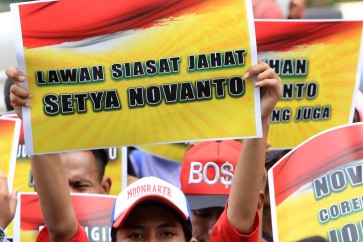Popular Reads
Top Results
Can't find what you're looking for?
View all search resultsPopular Reads
Top Results
Can't find what you're looking for?
View all search resultsGolkar: Old political force stands test of time
The party is struggling to repair its reputation because since 2016 a number of its high-level politicians have been involved in graft cases.
Change text size
Gift Premium Articles
to Anyone
E
stablished in October 1964, at the end of the leadership era of founding father Sukarno, Golkar has become the longest-lasting political party in the country. Strongly affiliated with the Army during its establishment, it started off as the Joint Secretariat of Functional Groups (Sekber Golkar), in which the founders gathered multiple civil organizations.
The group was formed in a bid to challenge the now-defunct Indonesian Communist Party (PKI) that was at that time considered to be gaining more power in the political and social spheres of the country, according to a history of the party published on its official website, Golkar.or.id.
It was meant as a non-political forum for 61 organizations that later developed into 291 group members including youth, farmers, laborers and women. The downfall of Sukarno marked by a failed coup attempt blamed on the PKI in September 1965 opened a path for the group to rise into the political arena.
The group, which later turned into the Golkar Party, officially took part in the election of 1971, the first one after Soeharto took over the presidency from Sukarno in 1967. In that election, Golkar came out as a winner followed it with a winning streak under Soeharto’s dictatorship until 1997, garnering an average of 60 percent of the vote. The victories were made possible by policies Soeharto issued that benefitted Golkar.
However, Soeharto’s fall from power in 1998 and the subsequent waves of demands for political and economic reforms forced Golkar to stand on its own two feet to win votes. In the 1999 general election, the first during the reform era, Golkar’s support suffered a significant drop as it came out second behind the Indonesian Democratic Party of Struggle (PDI-P). One major cause of Golkar’s electoral plunge was the termination of the Indonesian Military (TNI) and civil service party-membership blocks, which had formed two of the three mainstays of Golkar’s membership, in addition to its strong affiliation with Soeharto’s authoritarianism.
However, as an experienced political party, Golkar won back the national political crown in the 2004 elections.
The victory came under the leadership of Akbar Tandjung, who was Golkar chairman from 1998 to 2004. Although he took up his post at a most difficult time since he could only rely on the third element of Golkar, the functional group. Akbar managed to restore Golkar’s supremacy in Indonesian politics.


















